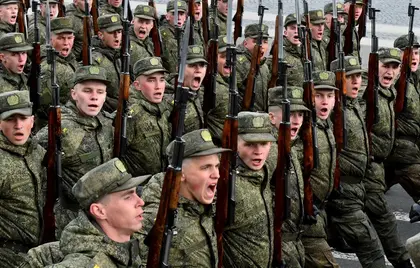The Russian Federation (RF) will struggle to make good equipment and personnel losses suffered in its war with Ukraine, and in some cases, it will probably be virtually impossible, Monday, May 2, Ukrainian and British military intelligence statements said.
A May 2 daily situation report published by the British Ministry of Defense said 35 percent of the RF’s entire military capacity has thus far been destroyed in the slightly more than two months of battles with Ukraine Armed Forces (UAF) units, and in some cases, RF formations have been so decimated it will take months if not years to reconstitute them.
- Look at the latest Ukraine news that was released today.
- Look at the most up-to-date Ukraine news that came out today.
JOIN US ON TELEGRAM
Follow our coverage of the war on the @Kyivpost_official.
Among the worst-hit, the estimate said, are the RF’s elite parachute infantry and air assault infantry regiments. According to UAF statements, in the early weeks of the war UAF units defending the Kyiv airfields, Vasylkiv and Hostomel ambushed RF paratroopers intending to capture the sites and inflicted sometimes devastating casualties.
Exacting recruiting standards in the RF’s airborne units, and particularly the need that small unit leaders in such formations be highly experienced and well-trained, will make quick replacement of personnel losses practically impossible, the British estimate said.
An analytical report by the Ukrainian Guildenhall news agency, citing Ukrainian defense intelligence sources, said the RF likewise will be hard put to replace heavy weapons destroyed in fighting in Ukraine, due to parts and labor shortages faced by RF arms manufacturers.
The May 2 article cited the Uragan rocket artillery as an example, noting that the Rzhev-based company Remvooruzhenie, which manufactures the system, is practically unable to work due to drastically curtailed cash flow and massive debt, which has forced lay-offs of most production line staff and left the company unable to acquire sub-components and individual parts. At present 18 rocket launch systems and 48 ammunition transport systems are on the Remvooruzhenie shop floor in a state of partial completion, and not being worked on at all, the article said.
RF authorities are attempting to bypass the bottleneck by shifting production to a company in a better financial state, called AO 75 Arsenal, in the city of Serpukhov, but that firm has never manufactured Uragan rocket artillery and will likely require a year to tool up for production and hire and train staff, assuming that parts for the systems might be found by that time, the report said.
The article said long-term impending or actual bankruptcy in RF companies producing fuel transporters and Buk anti-aircraft weapons has effectively halted any delivery of new systems to the RF army, for years. Ukrainian news agencies have widely publicized RF heavy use of foreign-manufactured components – now practically inaccessible to RF arms manufacturers because of western sanctions – in weapons systems ranging from tanks gunnery sights, infantry vehicle engines, and helicopter avionics, to cruise missiles, ballistic missiles, and drones.
UAF combat units likewise have repeatedly reported finding Ukrainian personal medical kits and combat boots worn by RF soldiers taken prisoner, according to POW accounts because RF personal soldier kit is not only inferior but at times dating back to the Cold War period. Allegedly, per those accounts, the RF military was unable to equip all soldiers with the modern personal kits, even at the outset of the war.
Oleksandr Kovalenko, a Ukraine-based military analyst, in a May 1 Telegram statement said that the RF’s military equipment shortages are now so pressing, that the Kremlin has approached the government of Kazakhstan for the possible loan or purchase of Russia-manufactured weapons and equipment now in use by the Kazakh military. Other Ukrainian media widely repeated Kovalenko’s report.
Russia-Kazakhstan relations recently took a dive after a public attack on Kazakhs by Kremlin propagandist Tigran Keosayan, who accused the Central Asian nation of disloyalty to Moscow for canceling May 9 World War Two victory celebrations, and warned Kazakhs “to look very carefully at Ukraine” before considering taking further steps that might make Moscow angry.
Keosayan’s comments provoked a wave of virulent anti-Russian reaction in Kazakhstan’s usually tolerant social media, and a Kazakh government statement that Keosayan should be banned from Kazakhstan.
You can also highlight the text and press Ctrl + Enter



